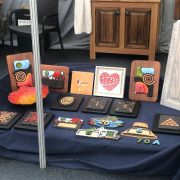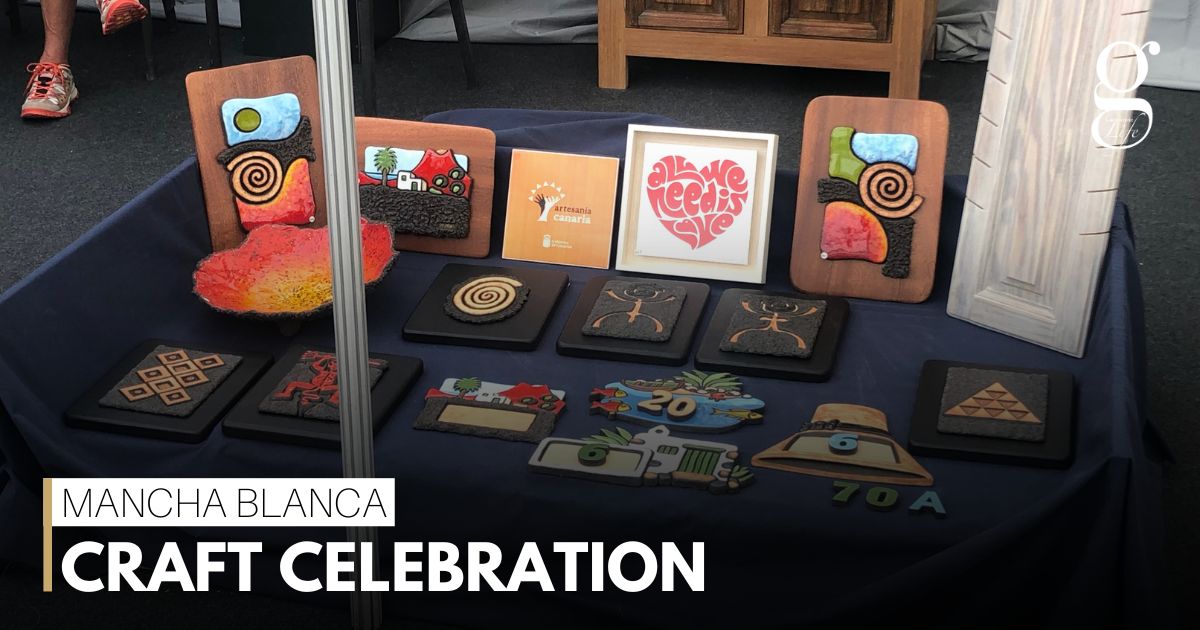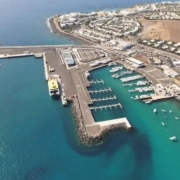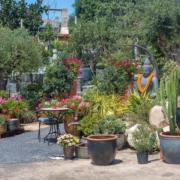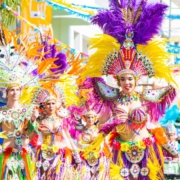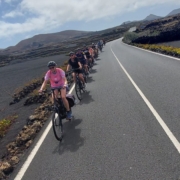Lanzarote’s crafters and artisans converged on Mancha Blanca last month for the biggest date in their calendar, and one of the most important craft events on the Canaries. We visited the Mancha Blanca Craft Fair and spoke to some of the stallholders there.
The Craft Fair is one of the main attractions during the Fiestas de Los Dolores – the most important of Lanzarote’s summer festivals. For three years, Covid restrictions have put a stop to this huge event, but the crowds were back again this year.
The Craft Fair is held in a large marquee located next to the church in Mancha Blanca. On your way there you’ll pass a statue of Doña Dorotea, the woman who revived pottery on Lanzarote and made the “Novios del Mojón” fertility symbols an emblem of the island.
Entering the marquee, you immediately find yourself in front of examples of Lanzarote’s most famous traditional crafts- the pretty embroidered rosettes that decorate tables, walls, and costumes; the rough pottery made from clay from the cliffs of Famara; the palm-weaving that can create items as tough as a log basket and as fine as a delicate bonnet.
Montse Selva proudly shows off the gorgeous fabrics that she weaves at her studio in Tinajo. Light, but sturdy, with beautiful geometric patterns that she calls a “universal language”, the textiles have a subtle, rich beauty that perfectly matches Lanzarote’s natural landscapes.
Gisela Serra’s fabrics also reflect the gentle beauty of Lanzarote’s rural interior. She uses natural dyes from cochineal, onion, fleabane, carrots, and other natural products to create lovely delicate silk, linen, and cotton garments.
Altogether more substantial are the glossy wooden carvings of Ángel Ossorio, a woodworker who has come to Lanzarote from his home in the beautiful valley of Herminia in La Gomera. He specializes in percussion instruments, and his wife shows the chacaras that he has made – heavy castanetstyle clackers. He also creates mortars, pestles and chopping boards, all as practical as they are beautiful.
There are some flashes of real innovation and brilliance on display at the Craft Fair. Felip Martín, for example, is a young luthier who started out making unique guitars and timples, before using his knowledge of acoustics to create natural wood loudspeakers for mobile phones. Just drop your phone in the slot and the sound is amplified – it’s an idea that won his company Estow Studios a place as finalist in the NY Now gift fair in New York City last year.
Another stall displays amazing lampshades created entirely from the sort of plain cardboard that packaging boxes are made of. The contours of the corrugations are cut to create beguiling, fluid patterns, and the only materials are recycled cardboard, glue, and a little paint.
Recycling is a common theme throughout the fair, with several stallholders using waste or found materials to create works of art.
There are also familiar faces here, too Las Chuchis is a fashion business started by La Graciosa resident María Jesús Páez. The La Graciosa fisherman’s shirt is a wellknown garment that was often worn by César Manrique, but María Jesús has given it a twist by making it out of vivid patchwork. The resulting garments are unmistakable and are rapidly becoming a symbol of the island.
María Luisa Guillén is one of the younger crafters keeping island traditions alive. Her hand-woven hats are genuine items of beauty, and she explains how the shapes vary from the more traditional broad-brimmed Lanzarote style to the bucketshaped hat that is a symbol of La Graciosa. She turns over one hat to display the delicate frame she has created from wheat stalks. Hats like this aren’t cheap – you’ll pay almost €200 for a good one – but they are unique in the world – each one the product of almost two-weeks of skilled handiwork.
Then there are the stalls where sheer beauty halts you in your tracks and captivates you – Sibisse Fayna, a jeweller from Tenerife, learnt filigree work in Mexico, and now creates intricate treasures of silver and treated copper.
The Craft Fair attracted hundreds of visitors this year, but if you missed it there are several other places where you can discover the skill and ingenuity of Lanzarote on display.
Crafts on Lanzarote
To discover crafts on Lanzarote, three places are indispensable. First, the Teguise Market on Sundays is home to several artisans, and you’ll find several more studios and workshops in the winding backstreets of the old town.
A trip to Haría on a Saturday morning will also reveal several local craftsmen and women selling their creations in the lovely, tree-lined central square. It’s also worth checking Haria’s Taller de Artesanía while you’re there, situated next to the town food market on C/ La Longuera.
The Monumento del Campesino not only has shops selling craftworks, but several studios and workshops where you can sign up to learn various crafts.
These are by no means the only places – the Cabildo has offered active support to artisans, and Lanzarote is the sort of place where you can bump into beauty and skill by pure accident.
For regular updates, pictures and videos of Lanzarote be sure to like and follow our Facebook page “Gazette Life Lanzarote”.

